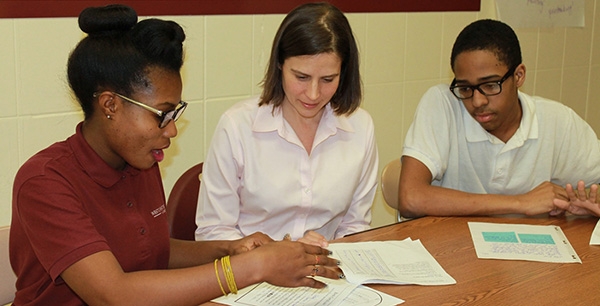Sara Dingledy '94
From federal policies to layoffs to student achievement evaluations, education is a contentious issue these days. As a teacher, administrator and founder of schools, Sara Dingledy '94, like countless others, is on the front lines of it all.
In 2001-2002, New York City (where Dingledy works) began closing large schools with unsatisfactory performance, like poor graduation rates. In their place, the newly created Department of Education, run by a centralized system under mayoral control instead of local boards, started opening smaller institutions.
“The idea behind this educational reform is that smaller, more customized schools can do a better job of graduating students than large, comprehensive schools,” said Dingledy, principal of Westchester Square Academy (Bronx). “It’s easy to see why this might be true. Smaller schools have a better grasp on who is attending and how they’re doing; they have personalization that goes a long way in a big urban setting, where kids are already fairly anonymous.”
“But I don’t think size inevitably predicts success. So much depends on excellent teachers, excellent leaders and leadership consistency, and other resources,” she added. “What would make the biggest difference, to me, is a paradigm shift – thinking of school not as a place or address, but as an idea, a methodology of doing things.”
And this is exactly how Dingledy thinks of, and operates, Westchester Square Academy, a small public high school she founded in fall 2012.
“The newer schools, regardless of size, embody this paradigm shift. They’re looking at community needs and considering how to educate based on those needs,” Dingledy said. “They’re not thinking of themselves as a place of instruction, but as a vision, as a way of educating.”
“At WSA, our mission is to develop confident leaders, writers and speakers who are connected to the community,” she continued. “And we help them make that connection with mentorship and advisory resources for each student.”
WSA offers a liberal arts curriculum in which students take elected courses in science, art and humanities. It currently has 260 ninth and tenth graders, but will grow to about 600 shortly, when the eleventh and twelfth grades are added. WSA is one of five new, small schools on the Herbert Lehman Campus in the Bronx, which has also retained one of its large, comprehensive schools. Half of WSA students are admitted by lottery, the other half by application.
Applications are up and interest in WSA has been high so far. It’s a good step toward building a thriving school – something Dingledy has done before.
As assistant head master of The Brooklyn Latin School (another small, specialized school) between 2008 and 2012, she shaped a curriculum that emphasizes inquiry, Socratic seminar and skill-based assessment. In April 2013, U.S. News & World Report ranked Brooklyn Latin No. 21 nationally, out of about 21,000 public high schools. In the state of New York, it ranked No. 1.
Dingledy hopes WSA will rise to similar heights.
“We’re off to a good start, but we have a long way to go,” Dingledy said. “Like all schools, we face big challenges.”
One, perhaps particular to new schools, is the past – not really having a past, that is.
“Schools thrive on history and tradition, and building from scratch – creating a culture and history when you don’t have one – can be difficult,” Dingledy said. “We also must overcome the same challenges as the community outside the school.
“We’re in the Bronx, so we deal with a lot of poverty, truancy, discipline issues and trying to impart good work habits. We have two full-time social workers for 260 students, the need is just overwhelming.”
But it’s a need Westchester Square Academy is doing its absolute best to meet. With dedicated teachers and social workers who advocate for and counsel the children, good things are happening.
“Our model works very well for the vast majority of students. Even after just two years, we have six or seven really strong success stories of previously struggling kids re-engaging with education,” Dingledy said. “We’re helping kids in a lot of ways; we’re doing so much more than just educating them.”
And that’s why she went into teaching, though she didn’t even know she wanted to at first.
After graduating from Union with a degree in anthropology, she was doing social work in Boston and thinking about becoming a nurse practitioner. A friend of hers was in the MAT program at Union and when Dingledy came back to visit, she met with Professor Patrick Allen. Allen, who would go on to become dean of the School of Education at Union Graduate College (now a separate institution), convinced her to stay.
“I just remember Professor Allen’s education reform class, it really motivated me,” said Dingledy, who earned an MAT in 1997. “It made me want to work in a city, to change education, to serve a community. Union and Patrick Allen brought me to education and inspired me to commit to doing something greater than just teaching.”
For more on Westchester Square Academy, visit www.westchestersquare.org

